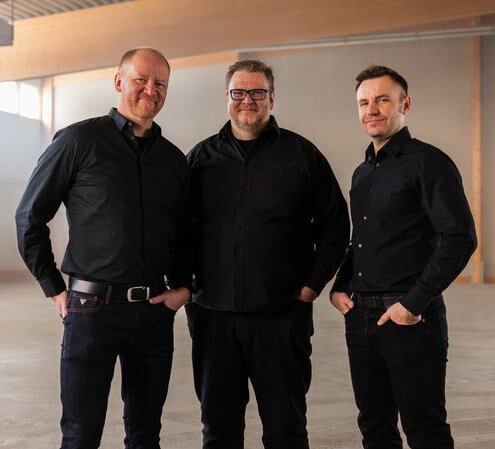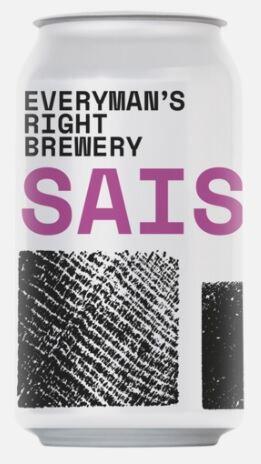Everyman’s Right Brewery says that although its ambitions require extra investment, it will also save money once production starts and hopes to amortize the costs of green technology within five years.
And the brewery has pledged to be open about the technology and climate-friendly solutions it is using: saying its broader mission is to make the whole brewing industry more sustainable.
Brewing up a sustainable idea
Located in the city of Savonlinna, in south east Finland’s lake area, the new brewery plans to start production at the beginning of 2019 with beers on the shelves by the summer. It will be carbon neutral and the trio behind the brewery aims to develop this to make it carbon negative.
The brewery’s co-founders are Jussi Hukkanen, who has 20 years’ experience in craft brewing; Antti Suikkari, who brings the brand, marketing and business know-how; and engineer Keijo Kemppainen.
The motivation for a sustainable brewery was twofold: firstly to set the brewery’s beers apart from others in a competitive market, but more importantly to help drive the brewing industry towards more sustainable solutions.
But although minimum emissions was the cornerstone of the concept from the beginning: the trio did not always believe that full carbon neutrality or negativity would be possible.
“We studied the craft beer market, started to talk about beers' sustainability and how consumer habits are changing – and how to differentiate from other craft breweries,” Suikkari told BeverageDaily.
“After pivoting around the idea for a few times, we ended up planning a sustainable brewery which would have minimal carbon emissions, or not emissions at all - a carbon neutral brewery.

“First we thought it might not be possible to reach carbon neutrality, but after researching modern green tech solutions and talking with professors from Lappeeranta University, they convinced us it was possible.
“A lifecycle assessment company in Finland, LCA Consulting Oy, did a study on our brewery plans: highlighting the production processes which are critical to achieving carbon neutral brewing.
"At the same time, we got a holistic overview of the energy needed for production, and of energy and resources which can be recycled back into the process.”
Sustainability: ‘This is a bigger thing than us’
Sustainability will be a point of differentiation for the brand – but also ultimately a necessity, says Suikkari.
“Craft beer has shaken the beer market and there still appear to be thousands of craft breweries in planning around the world - it will be difficult for all breweries to succeed in this environment," he said.
"As in any business there is the risk of failure if you can't differentiate from your competitors. We believe that there is a big gap in the global beer market for sustainable, climate-friendly craft beer like ours – this is what will differentiate us from the rest.”
“Consumers are starting to ask more questions about the products they consume, about how they are made and what is in them, and how they affect environment and climate."
But sustainability is bigger than one brewery's beers in Finland, he said.
“Whether you believe in climate change or not, it’s going to affect everyone. In fact, climate change will not only impact consumers but also brewers of all sizes. It’s going to affect water quality and availability, and how and where barley and hops are grown. So, this is a bigger thing than us.”
‘The normal way to offset carbon is by planting trees. We think that’s cheating’
According to the LCA study, the brewing process in Everyman’s Right Brewery can achieve a net zero carbon footprint. Beer will be produced with 100% renewable energy, from the brewery’s own energy sources – Suikkari says such self-sufficiency is “remarkable and progressive in the brewing industry.”
'Everyman's Right'
'Everyman's Right' is a Nordic term that refers to the right and freedom to enjoy nature - as long as nature is not harmed.
'Based on the same ideology, we believe that everyone should have the right to choose sustainable beer; and have the right to enjoy nature in the future, too,' says the brand.
Carbon negativity, however, is the reduction of the carbon footprint to less than neutral, giving the net effect of removing carbon dioxide from the atmosphere rather than adding it.
“That achievement requires a more aggressive approach than carbon neutrality, which merely nullifies the effect that our brewery has on the environment,” said Suikkari.
“Typically carbon-negative status can be achieved by a number of means, including greater carbon sequestration (a professor from Lappeenranta University suggested making a single cell protein from our excess CO2 and selling it as protein powder to make protein bars) and obtaining carbon offsets from a third party or in our case by selling our extra green energy (for example biogas, methane for traffic use).
“The normal way to offset carbon is done by engaging in activities that directly reduce that amount of carbon dioxide in the atmosphere. Such activities include planting trees but we think that's cheating. If we go out to plant trees we would be carbon negative in a snap of fingers.”
Assessing each stage of production
By starting from scratch and considering sustainability the bedrock of the brewery, the trio have been able to assess every stage of production.

“I don't want to say it's impossible to convert an existing brewery to reach carbon neutrality, but it would be a challenge,” said Suikkari.
“The lifecycle assessment highlighted the critical production processes which are critical to achieving carbon neutral brewing. Brewery layout and processes are affected by the green tech - it affects basically everything.”
And as testament to the trio’s forward planning, the brewery has already catered for sustainable expansion: ready to scale up from its initial production estimates of 1 million liters per year to 3-5 million liters.
The biggest challenges have been in understanding the processes and commitments needed, as well as finding the right partners and manufacturers, said Suikkari.
“Modularity and possibility to scale up the green tech is vital for us if we commit to product sustainable products,” said Suikkari.
“Of course all this green tech will raise our initial investment to start the production – we are roughly speaking about one million euros extra investments. The cool thing is that these investments will also save us money.
"We are self-sufficient with our production energy need and CO2, so we don't have to buy methane or CO2. There's no need to pay for waste handling or transportation. We have calculated that amortization of our green technology investments will be reached in five years or less.”
Everyman’s Right Brewery has started a crowdfunding equity campaign on FundedByMe, seeking to raise between €480,000 and €1,200,000. You can also read more about the brewery on their website.
Cutting carbon at Everyman's Right Brewery
- The brewery will reuse its spent grain (mash), hops and yeast for biogas production, the biogas (methane) will be used to produce energy for our brewing process. “Based on the study, the process might generate more biogas than we need and we can use excess biogas to generate green energy (electricty and heat), or one option is to sell the excess biogas to fuel biogas powered cars – I actually ride biogas powered car myself,” said Suikkari. “The biogas will power the brewhouse through steam generator and steam is also used in sterilization and cleaning.”
- The brewery will collect and purify the CO2 to beverage grade from the fermentation tanks and reuse it again for carbonating beer and in the filling process. It plans to bottle the excess CO2 and offer it to beer pubs and restaurants. “We see that as a great marketing opportunity - maybe some pubs commit to use only beer-made-CO2,” says Suikkari.
- Excess heat from the process will be recovered. “Heat comes from three sources. Heat from brew kettle and wort cooling is used to preheat the water in the hot water tank, and it's used for production and cleaning. Thirdly we collect heat from ventilation and specially during the winter recycle it to warm the office spaces.”
- The brewery commits to using only green, fossil free and carbon neutral energy in production. “Some of it might come from our own solar plant, or we buy it from the network. We are currently negotiating with solar power investors if they build the solar plant for us and we commit to buy the energy from them. It's a win-win situation for both parties.”
More detailed information about carbon neutral and negative processes is available here.
